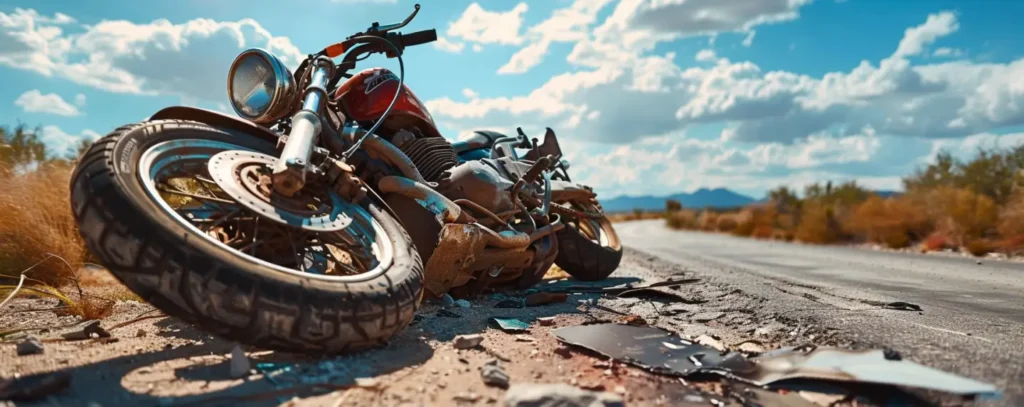
Tips for Successful Motorcycle Accident Claims
If you’ve been involved in a motorcycle accident, understanding how to make successful motorcycle accident claims is crucial. This guide will walk you through the essential steps, from gathering evidence to working with a lawyer, ensuring you get the compensation you deserve.
Key Takeaways
- Gathering substantial evidence such as police reports, photographic evidence, witness statements, and medical records is crucial to building a strong motorcycle accident claim.
- Taking immediate steps after a motorcycle accident, including seeking medical attention, documenting the accident scene, and notifying law enforcement and your insurance company, is vital for both your safety and the success of your claim.
- Hiring a motorcycle accident lawyer provides legal expertise, assists in negotiating with insurance companies, and helps build a compelling case, which is essential for receiving fair compensation.

Importance of Evidence in Motorcycle Accident Claims
Gathering substantial evidence is the cornerstone of a successful motorcycle accident claim. Building a strong case requires comprehensive documentation that demonstrates fault, liability, and the extent of damages. Key types of evidence include police reports, photos and videos of the accident scene, witness statements, and medical records. This evidence not only supports your claim but also helps disprove any counterclaims made by the defendant.
Without solid evidence, proving the other driver’s negligence and securing fair compensation from the other driver becomes significantly more challenging.
Police Report
An official police report provides an authoritative account of the motorcycle accident, detailing the following:
- Time
- Place
- Involved parties
- Any citations issued
This report is vital for your personal injury claim as it establishes the facts surrounding the incident. While it might not be admissible in court, it can provide insightful information to your attorney and help reinforce your case.
Photographic and Video Evidence
Visual evidence, such as photos and videos, offers clear and undeniable proof that can support your motorcycle accident claim. Here are some key details to document:
- The accident scene
- Vehicle positions
- Road conditions
- Visible injuries
- Skid marks
- Property damage
Capturing these details will help create a compelling visual narrative for your claim.
Witness Statements
Witness statements can significantly strengthen your motorcycle accident case by corroborating your account of the incident. Collecting contact information and statements from witnesses at the accident scene helps provide an unbiased perspective that supports your claim.
Expert witnesses, such as engineers and medical professionals, can also offer valuable testimony to reinforce your case.
Medical Records
Medical records are critical in proving the severity of your injuries and the associated costs. These records include:
- Descriptions of injuries
- Treatment plans
- Medical bills
- Test results
All of these are essential in verifying the impact of the accident on your health and finances.
Consistently following through with all recommended medical treatment is crucial for both your recovery and your legal case.
Steps to Take Immediately After a Motorcycle Accident
The moments following a motorcycle accident are critical. Here are some essential steps to take:
- Prioritize safety
- Seek immediate medical attention
- Document the accident scene
- Contact law enforcement
- Notify your insurance company
These actions not only ensure your well-being but also lay the groundwork for a strong motorcycle accident claim.
Seek Medical Attention
Even if you feel fine after a motorcycle accident, it’s imperative to seek medical attention immediately. Adrenaline can mask serious injuries such as concussions or spinal cord damage, which may have delayed symptoms,. Visiting a doctor promptly ensures that any hidden injuries are diagnosed and treated, and it also provides medical documentation crucial for your motorcycle accident injury claim.
Document the Scene
Thoroughly documenting the accident scene can make all the difference in building a solid motorcycle accident case. Here are some steps to follow:
- Take photos and videos of vehicle positions
- Take photos and videos of vehicle damage
- Take photos and videos of road conditions
- Take photos and videos of any visible injuries
- Consider adding a camera to your motorcycle helmet to provide real-time footage of the other driver’s actions.
By following these steps, you can ensure that you have all the necessary evidence to support your case.
Retaining your motorcycle as evidence can further strengthen your legal position.
Contact Law Enforcement
Contacting law enforcement immediately ensures the accident is officially recorded, which is vital for your motorcycle accident claim. A police report provides an impartial account of the incident, detailing the facts and any citations issued,. When interacting with police officers, be honest but avoid admitting fault, as this can be used against you later.
Notify Your Insurance Company
Promptly notifying your insurance company about the motorcycle accident is crucial to avoid complications or denial of your claim. Most policies require accidents to be reported within a specific timeframe, often 24 hours. Failing to do so can result in complications or a denial of your motorcycle accident injury claim.
Contact us today and we will help you get the compensation that you deserve.
Working with a Motorcycle Accident Lawyer
Hiring a motorcycle accident lawyer can be instrumental in navigating the claims process. Lawyers can help you in the following ways:
- Collecting evidence
- Proving negligence
- Negotiating with insurance companies
- Building a strong case to increase your chances of receiving fair compensation
Their expertise ensures that all necessary steps are taken to protect your legal rights and achieve a favorable outcome.
Legal Expertise
Motorcycle accident lawyers possess extensive knowledge of traffic laws, personal injury laws, and insurance regulations. This expertise allows them to provide valuable guidance throughout your case, from examining police reports and medical records to understanding the biases and challenges specific to motorcycle injury claims.
Negotiating with Insurance Companies
An experienced attorney can effectively communicate and negotiate with insurance companies on your behalf, ensuring you receive fair compensation. Lawyers understand the language used by insurers and are familiar with all applicable laws, which helps them argue your case more effectively and avoid any mistakes in your statements.
Building a Strong Case
A motorcycle accident lawyer will gather evidence, obtain expert testimony, and analyze all documentation related to the incident to build a solid case. This includes reviewing police reports, witness statements, and other relevant evidence to support your claim and prove the other driver’s negligence.
Types of Compensation Available in Motorcycle Accident Claims
Motorcycle accident claims can include various types of compensation, covering both tangible and intangible impacts. These can include:
- Economic damages: addressing physical monetary losses like medical bills and property damage
- Non-economic damages: covering pain and suffering, emotional distress, and loss of enjoyment of life
- Punitive damages: awarded to punish the negligent offender and deter similar behavior in the future
Economic Damages
Economic damages cover tangible costs such as medical bills, lost wages, and property damage. Injured motorcyclists should document all accident-related expenses, including travel costs, prescriptions, and assistive devices. These documented expenses are crucial for determining the value of your claim and ensuring you receive fair compensation.
Non-Economic Damages
Non-economic damages address intangible impacts like pain and suffering, emotional distress, and loss of enjoyment of life. These damages recognize the full scope of harm experienced by the injured party beyond financial losses. Thorough documentation, including medical records and psychological evaluations, is essential to prove non-economic damages.
Punitive Damages
Punitive damages are awarded to punish the negligent offender and deter similar behavior in the future. These damages are typically reserved for cases involving severe misconduct, such as driving under the influence (DUI). Clear evidence of the at-fault party’s actions and disregard for safety is required to be eligible for punitive damages.
Understanding the Claims Process
The claims process for a motorcycle accident involves the following steps:
- Proving fault
- Filing a claim
- Negotiating with insurance companies
- Potentially settling or going to court
Understanding this process is crucial for navigating the complexities of personal injury claims and ensuring you receive the compensation you deserve.
Filing the Claim
When filing a motorcycle accident claim, it is crucial to provide specifics of the accident and include supporting documents such as medical records, police reports, and witness statements. Establishing the other driver’s responsibility and quantifying the damages incurred are essential elements of a valid claim.
Insurance Company Response
The initial response from an insurance company often involves negotiations or mediation to reach a settlement agreement. An insurance adjuster typically presents an offer within 20-30 days.
If negotiations do not result in a satisfactory settlement, mediation may be the next step.
Settlement Negotiations
Settlement negotiations can take several months, involving multiple rounds of discussions and potential mediation. The process requires communication and critical thinking skills to reach a mutually satisfactory agreement.
If a fair settlement is achieved, the claimant must sign a release agreement, waiving the right to further legal action.
Common Challenges in Motorcycle Accident Claims
Motorcycle accident claims, a type of motor vehicle accident, often face significant challenges, including bias against motorcyclists, disputes over fault, and inadequate settlements for motorcycle accident injuries. Overcoming these obstacles requires strong evidence, firm negotiations, and sometimes litigation in cases of motorcycle accidents. Pursuing a motorcycle injury claim can be a complex process, but it is essential for victims to receive the compensation they deserve.
Understanding these challenges can help you navigate the claims process more effectively and achieve a fair outcome.
Bias Against Motorcyclists
Implicit bias against motorcyclists can affect:
- Law enforcement
- Insurance adjusters
- Juries
- Judges
Riders are often stereotyped as reckless and unsafe, which can unfairly shift blame onto them.
Presenting strong evidence and countering false narratives is crucial to overcoming this bias and securing fair compensation.
Disputes Over Fault
Disputes over fault are common in motorcycle accident cases. Lawyers gather evidence, such as accident scene investigations and witness statements, to resolve these disputes and hold the responsible party accountable.
Avoid admitting fault during the initial notification to your insurance company, as this can be used against you.
Inadequate Settlements
Insurance companies often offer low settlements due to motorcycle bias. Firm negotiations are essential to ensure you receive fair compensation. If negotiations fail, considering litigation may be necessary to achieve a just outcome.
Frequently Asked Questions
Why is evidence so crucial in a motorcycle accident claim?
Having solid evidence in a motorcycle accident claim is crucial because it helps establish fault, disproves the defendant’s claims, and demonstrates the extent of damages. Without it, proving negligence and securing fair compensation becomes significantly more challenging.
What should I do immediately after a motorcycle accident to protect my claim?
After a motorcycle accident, prioritize safety, seek medical attention, document the scene, contact law enforcement, and notify your insurance company to protect your claim. Taking these steps is crucial for your well-being and to build a strong claim.
How can a motorcycle accident lawyer help me?
A motorcycle accident lawyer can help you by collecting evidence, proving negligence, negotiating with insurance companies, and building a strong case to protect your legal rights and achieve a favorable outcome. Their expertise ensures all necessary steps are taken.
What types of compensation can I receive for a motorcycle accident?
You can receive economic damages (medical bills, lost wages, property damage), non-economic damages (pain and suffering, emotional distress), and punitive damages for a motorcycle accident.
What are common challenges in motorcycle accident claims?
In motorcycle accident claims, common challenges include bias against motorcyclists, disputes over fault, and inadequate settlements offered by insurance companies. To overcome these obstacles, it’s important to gather strong evidence, engage in firm negotiations, and be prepared for possible litigation.
Last updated Tuesday, July 9th, 2024







